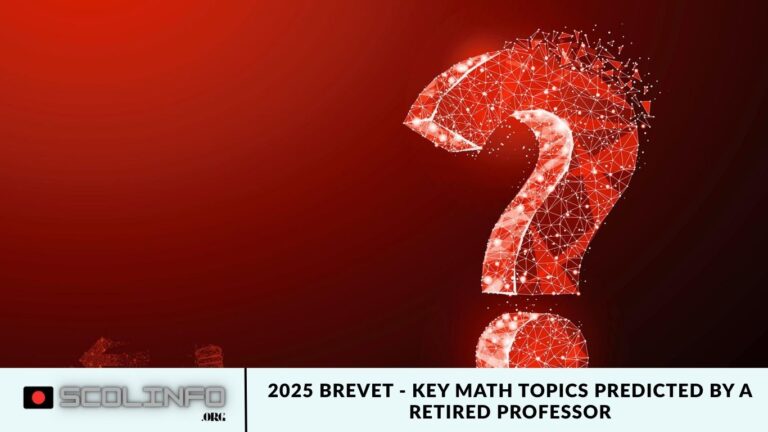As hundreds of thousands of middle school students gear up for the 2025 Brevet mathematics exam, speculation is rising about the key topics likely to appear this year. According to a recently retired mathematics teacher, a clear trend in exam content has been identified, offering valuable insights for students preparing to excel in their studies.
Prediction or methodical reading of past trends?
“These are the math topics expected to appear this year,” said Alain M., a retired mathematics teacher, speaking with calm confidence. He dedicated 35 years to teaching middle school and now spends his mornings analyzing Brevet exam papers and official inspection reports.
Alain M. explained, “I’m not claiming to predict the future. I base my insights on statistics, subject cycles, and curriculum requirements.”
Although the exact topics remain confidential until the exam day, several online educational platforms, including Nomad Education and digiSchool, provide well-informed predictions on the most likely math topics for students to focus on.
Highly likely subjects according to recurring indications
By analyzing trends from previous years and considering the current curriculum, a clear pattern emerges regarding the math chapters most likely to appear in the 2025 Brevet:
- Numbers and Calculations: powers, fraction operations, and order of operations.
- Literal Calculus and First-Degree Equations: expansion, factorization, and simplification of expressions.
- Proportionality: problems involving percentages, scales, and rates of change.
- Geometry: Thales’ theorem, Pythagoras’ theorem, and right-triangle trigonometry.
These high-probability topics are consistently highlighted by online educational platforms like digiSchool and Nomad Education, which release annual predictions based on patterns observed in past Brevet sessions.
Less certain chapters, but not to be neglected
Some math themes, while appearing less consistently, still recur in Brevet exams. Experts and teachers agree that these topics also deserve careful attention from students preparing for the 2025 math exam.
| Thematic | Detail |
|---|---|
| Areas and volumes | Calculations on cylinders, right blocks, spheres |
| Affine functions | Reading charts, researching background |
| Statistics | Averages, medians, chart readings |
| Probabilities | Single tests, calculations of drawing chances |
These topics appear less frequently than the core subjects, but when they do, they can significantly impact exam scores, explains Alain M., while reviewing correction grids from previous Brevet exams.
These concepts that rarely come up, but exist in the program
Finally, some program elements, while taught in class, are considered unlikely to appear in the 2025 Brevet exam. This is due to their historically low frequency in past exams or because they have already been emphasized in international centers this year, such as in Asia (according to Le Figaro Étudiant).
- Algorithms and programming: not yet fully integrated into the curriculum.
- Complex geometric transformations.
- Sequences of figures or tessellations are often treated as minor topics.
Despite their lower probability, students should not completely ignore these areas. The Official Bulletin of National Education emphasizes that each Brevet exercise can test multiple skills simultaneously, making well-rounded preparation essential.
Smart revision: advice from a retiree (and others)
When asked about the most effective ways to prepare, Alain M. emphasizes a combination of strategy and discipline:
Alain M. explains, “Mastering the fundamentals is crucial. I always advise my former students: don’t study to guess the exam topics—study to be able to solve any problem.”
In practical terms, online platforms such as Studyrama, L’Étudiant, and Nomad Education offer corrected past papers and interactive quizzes, enabling students to practice independently and effectively reinforce their skills.
FAQ’s
What are the key math topics predicted for the 2025 Brevet?
According to retired math teacher Alain M., the most likely topics include numbers and calculations, literal calculus and first-degree equations, proportionality, and geometry.
How reliable are these predictions for the 2025 Brevet?
While no one can guarantee the exact questions, predictions are based on historical trends, curriculum cycles, and exam patterns, making them a strong guideline for preparation.
Are there any less common topics students should still study?
Yes, topics like algorithms, complex geometric transformations, and figure sequences appear less frequently, but they can still impact scores if included.
How should students balance studying core versus less common topics?
Focus primarily on the fundamental topics but allocate some time to minor topics, since each Brevet exercise can test multiple skills simultaneously.
Can practicing past papers help in preparing for the 2025 Brevet?
AbPracticing with Nomad Education, digiSchool, Studyrama, and L’Étudiant offers corrected past papers and quizzes to build problem-solving skills. Do these predictions apply to both middle- and high-performing students?
Yes. Predictions highlight topics with high probability, helping all students—whether aiming for excellence or solid passing scores—focus their preparation effectively.
How often do geometry topics appear in the Brevet?
Geometry topics, such as Thales’ theorem, Pythagoras’ theorem, and right-triangle trigonometry, are consistently featured and are considered high-probability chapters.
Conclusion
While the 2025 Brevet mathematics exam will always retain an element of surprise, analyzing historical trends, curriculum patterns, and expert insights offers students a strategic advantage. Focusing on high-probability topics such as numbers and calculations, literal calculus, proportionality, and geometry, while not neglecting less frequent areas, ensures a well-rounded preparation.


